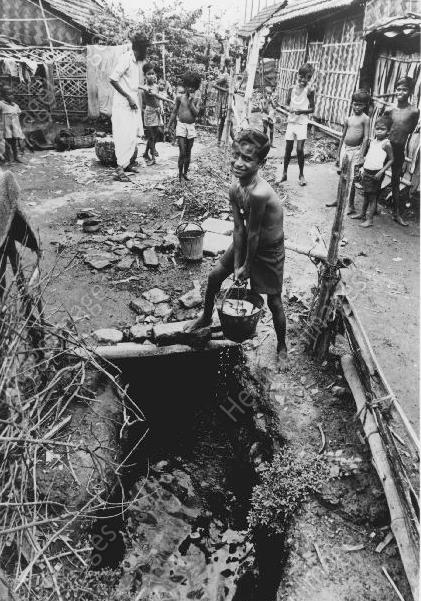
Economics: Post-World War II Economic Development

Figure 1.-- The process of decolinization began after World War II, beginning with India (1947. The new Indian leaders like Prime Minister Jawaharlal Nehru believed that with independence and the superiorit of Soviet-style state planning and socialism, he would be able to guide indeendent India into a new era of prosperity and abundance. The result was a surprise dose of reality. India made no economic progress. Nehru and his suceesors refusd to give up the socialist dream. This was the result. A Calcutta boy dumps garbage in an on ditch by his home. Only after four decades of economic failure did a new generation of Indian leaders begin to experiment with market refrms. The result was the rapid creation for the first time in Indian history of a large, prosperous middle class. Source: Kent Kobersteen, 1982 World Hunger Media Award
|
|
Modern industrial ecomomies emerged in Europe beginning with Britain where the Industrial Revolution began about 1740 and gradually spread to the Continent. Economic development also occurred in the United States and some English colonies (Australia, Canada, and New Zealand). A comcomitant of industrial development has been varying degrees of political democracy. Except for Japan, other countries did not attempt or failed to succeed with the Western economic model--actually the keys to economic deveopment that have since proven as effective in other areas as well as the West. Russia which until World War I was rapidly developing, but the Revolution shifted the economic model to state planning and socialism. This was also attempted by China after World War II. With Decolonization, many newly independent countries like India, Indonesia, and countries througout Africa pursued socialist ideas and big government economic planning. The new leaders ignored the florishing West European ecnomics and embraced the economic policies of the Soviet Union and its Easern European empire. The results astonished many, none more so than the Soviets. The fundamental inefficenies of socialism led to the deimse of the Soviet behemoth. The results in China were even more shocking. China experienced disasters in which millions perished. The Great Leap Forward resultedin the worst famine in hinese history--even worse that the World war II crisis. The results in other areas was generally less draconian, but the bright hope of independence were dashed on the ideological commitent to socialism. The results despite billions of dollars of Western aid was a range of unfavorable results. The countries unless they had oil virytualkly without exception eprienced either economic stagnation or actul declines in living standards. Diverging from the established pattern, several Asian countries (Singapore, South Korea, and Taiwan) after the War achieved considerable success. And China of all countries went from radical Maoist Communism to free market reforms, albeit without political democracy. The market refors in obly a few shrt years transformed China crarting a prosperous middle-class India after independence embraced a socialist system with state planning and a stifeling beaircracy. The economy languished. Free market reforms have in recent years jump-started the economy and aso created a large middle-class. Socialism and big-government continue to have appeal and has India eld back from many needed reforms. A new Government elected with a substanial mandate is considering major reforms(2014). The countries of Africa, Asia, Latin America, and the
Middle East have had great difficulty in developing productive modern ecomonomies until adopting market reforms.
CIH

Navigate the Children in History Website:
[Return to the Main Economics Page ]
[Introduction]
[Biographies]
[Chronology]
[Climatology]
[Clothing]
[Disease and Health]
[Economics]
[Geography]
[History]
[Human Nature]
[Law]
[Nationalism]
[Presidents]
[Religion]
[Royalty]
[Science]
[Social Class]
[Bibliographies]
[Contributions]
[FAQs]
[Glossaries]
[Images]
[Links]
[Registration]
[Tools]
[Children in History Home]
Created: 11:36 PM 7/17/2014
Last updated: 11:36 PM 7/17/2014



